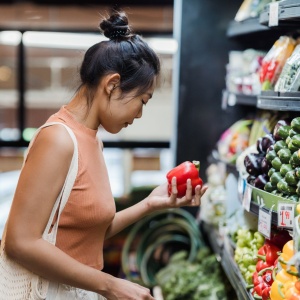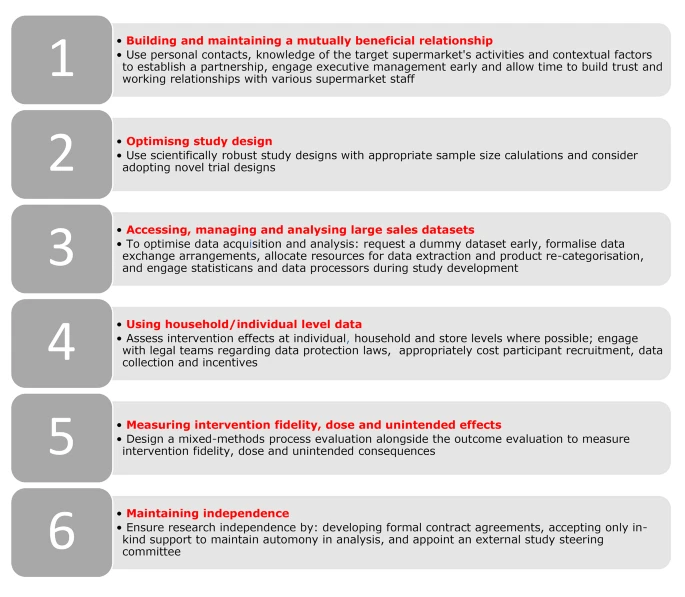
Supermarkets provide the majority of food to consumers in the Western world and are therefore an excellent site for research into food environment interventions. However, such interventions can be hard to research and implement due to the misalignment of public health and commercial priorities, as well as difficulties with brokering relationships between supermarkets and researchers. This paper distils the experience of several studies to provide specific recommendations for conducting high quality research with commercial retail chains.
Supermarkets are an excellent setting to research food environments because of their dominance in food provisioning (providing 83% of food in the UK). This means even incremental improvements in the supermarket environment could substantially improve population health. Supermarket sales data is also collected at store level and household level (through loyalty cards) providing more accurate data than self-reported dietary assessments, which can be subject to bias and partial recall. In addition, supermarkets provide a ‘real-life’ setting that produces more generalisable results than experimental studies.
This paper sets out a series of recommendations, based on research experiences for a collection of case studies in three high income countries (Australia, the Netherlands and the United Kingdom). These recommendations were grouped into six categories (see image) in order to outline an approach to brokering future research partnerships.

Image: Fig. 1, Vogel, et. al., 2023. Six recommendations for conducting high quality public health research with national supermarket chains
- Building and maintaining a mutually beneficial relationship - No best method for developing a relationship is suggested, but utilising personal connections, engaging with executive management and responding to supermarkets that approach researchers are all mentioned as previous successful strategies. It is recommended to maintain a good relationship through identifying mutual benefits and co-creating interventions, keeping open communication to develop trust and managing challenges as they arise.
- Optimising Study Design - It is possible to design randomised control studies using price interventions through individual loyalty schemes; however this is more challenging for interventions at the store level. It is important for researchers to engage with both statisticians and supermarkets to obtain adequate store numbers in future supermarket intervention studies. However, these numbers can be difficult to obtain given commercial priorities and so novel methods, such as the stepped-wedge approaches may be necessary.
- Accessing, managing and analysing large sales datasets - It is common to experience delays and lags accessing sales data. Supermarket data also requires substantial time investment to reformat and re-categories. Requesting dummy data can help reduce these time pressures by allowing the researchers to set up data processing before the full dataset has been received. Formal data exchange agreements should be set in place up-front before the project begins to avoid delays. The author also recommends involving a statistician and skilled data processor to facilitate data transformations and analyses.
- Using household data - The authors recommend that individual and household level data be collected in spite of the difficulties with data protection laws and the constraints on resource and time. This extra level of details greatly improves understanding of how different customer groups respond to supermarket interventions.
- Measuring intervention fidelity, dose and unintended effects - Using a mixed method process evaluation can help contextualise results. For example, it was found through qualitative data that some customers would not use fruit and vegetable subsidies because the cost of these products was considered more competitive in other stores.
- Maintaining independence - Ensuring independent analysis of findings is paramount for creating external trust in a studies findings. This independence can be further ensured through an external steering committee’s oversight, as well as through developing formal contracts through the organisation's legal teams that clearly summarises work and reporting arrangements.
Abstract
A collective case study approach was used to synthesise experiences of engaging and sustaining research collaborations with national supermarket chains to test the effectiveness of health-focused in-store interventions. The collective narrative covers studies conducted in three high-income countries: Australia, the Netherlands and the United Kingdom.
We have distilled our experiences and lessons learned into six recommendations for conducting high quality public health research with commercial supermarket chains. These include: (i) using personal contacts, knowledge of supermarket activities and engaging executive management to establish a partnership and allowing time to build trust; (ii) using scientifically robust study designs with appropriate sample size calculations; (iii) formalising data exchange arrangements and allocating adequate resource for data extraction and re-categorisation; (iv) assessing effects at individual/households level where possible; (v) designing a mixed-methods process evaluation to measure intervention fidelity, dose and unintended consequences; and (vi) ensuring scientific independence through formal contract agreements.
Our collective experiences of working in non-financial partnerships with national supermarket chains could be useful for other research groups looking to develop and implement supermarket studies in an efficient manner. Further evidence from real-life supermarket interventions is necessary to identify sustainable strategies that can improve population diet and maintain necessary commercial outcomes.
Reference:
Vogel, C., Dijkstra, C., Huitink, M., Dhuria, P., Poelman, M.P., Mackenbach, J.D., Crozier, S., Seidell, J., Baird, J. and Ball, K., 2023. Real-life experiments in supermarkets to encourage healthy dietary-related behaviours: opportunities, challenges and lessons learned. International Journal of Behavioral Nutrition and Physical Activity, 20(1), pp.1-13.
Read the full article here







Post a new comment »